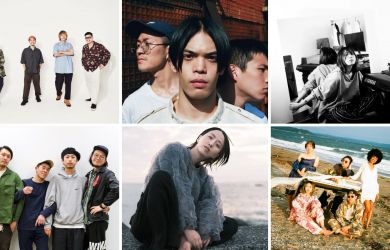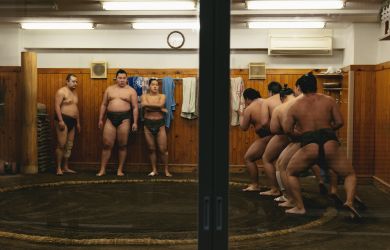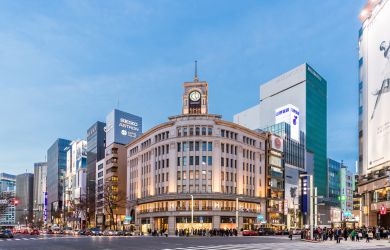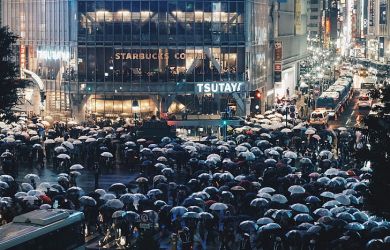
December 30, 2013
Baye McNeil
The author talks about his second home town of Yokohama and his love of trains
By Metropolis
Originally published on metropolis.co.jp on December 2013

Why did you choose to live in Yokohama, rather than any other part of Japan?
There’s a certain energy to Yokohama that you don’t get in Tokyo. I’m originally from Brooklyn, New York. Though us Brooklynites are fiercely proud of our town, that island across the bridge from us called Manhattan gets the lion share of the press. And that’s OK, for real New Yorkers know that if you want to experience what’s left of real NY, Manhattan (particularly the areas that get the most media exposure) is a waste of time. Brooklyn should be your first stop! And us Yokohamians, Japanese and non-Japanese alike, seem to share that kind of allegiance to Yokohama. So I set up shop here and never looked back. To me, Yokohama is the Brooklyn of Japan.
What made you decide to start blogging about your life and teaching career in Japan?
A number of things, actually. Initially the decision was prompted by my desire to fulfill a promise I made to my girlfriend Aiko (to whom the first book was dedicated) who had passed away. Another reason is I love to write, always have and, god willing, always will. The third reason is writing has always been therapeutic, even cathartic, for me. A way for me to get out of my own head for a while and connect with other people, and express myself with a clarity and style that I’m not always able to accomplish in person.
And most importantly, the process of keeping a blog, which I found often becomes a collaborative effort between you and your readers, helped me learn to convey the thoughts and feelings that bombard me constantly in creative and constructive ways. Without it, I’m sure I would’ve been consumed by the chaos my life became as I made the transition from New Yorker to Ex-pat. Loco in Yokohama helped me to retain my balance; though I’ve gone through tremendous changes, my blog helped me keep a firm grasp on the essential me, while crafting stories that entertain, enlighten or at least help others to navigate through life here or wherever similar challenges abound.
As the blog picked up popularity, did that in turn have an effect on your teaching or other aspects of your life?
Yes, it did. The thing about blogging is it’s mostly about serving a community; one of the rewards being that often that community will serve you in return, whether out of gratitude for the effort you’ve put into your blog or by a connection they’ve made with you via your writing. Some believe that people you engage virtually don’t have as much value as people you know offline. And I was a proponent of that way of thinking until I started blogging.
Once I started really connecting with people through this medium, though, I realized the foolishness of that way of thinking. Like Frank Capra illustrates in his masterpiece, It’s a Wonderful Life, our lives touch other lives in ways we are hardly cognizant of until something happens that makes it readily apparent. Blogging, for me, is what crystallized this truism. So much so that the editor of my second book and the artist of both books are people I’ve only met virtually, through my blog. Via the blog I have met many people whose knowledge base is very different from my own but vast nonetheless. Some have even given me tips on how to resolve issues I’ve had regarding teaching, and those tips, when practical, sometimes found their way to my classroom. In that way, blogging has made me a not only a better writer but a better teacher, as well.

Your first book Hi! My Name Is Loco and I Am A Racist came out in 2012. Was the decision to write that based on 3/11?
Yes, in part. I mean, the book was already underway by the time that dark period was upon us. But, the events of that day, in particularly the changes I recognized in the behavior of our hosts in the weeks just following the earthquake, had a profound effect on me and pretty much handed the book’s optimistic conclusion to me on a silver platter.
You followed up that book pretty quickly with Loco in Yokohama. What prompted you to come out with the second book?
A number of things. One is I didn’t want to be pegged as the “race” writer in Japan. I mean, as any foreigner who lives here knows, race is pretty much an inescapable facet of life here, whether we like it or not, or whether we choose to acknowledge it or not. We are constantly being objectified and usually this is being done, directly or indirectly, on the basis of race. The degree of objectification and how each of us chooses to deal with this issue of course varies from person to person, but you’d be hard-pressed to find a conscientious person that isn’t aware of this on some level. But, for the most part, anyone who chooses to address this is quickly dismissed and labelled a “complainer” “race-baiter” “whiner” and a whole host of other derogatory slurs not as polite as those. Something about my writing on “race” brought out the worst in mostly non-Japanese in Japan. And as a blogger who occasionally gets deeper into these issues than most I have been on the business end of such denigration from fellow non-Japanese since my blog’s launch back in 2008. But, as my blog reflects, I have many other topics I feel strongly enough about to invest the time and energy it takes to make a book.
The other reason I put out the second book so quickly is, though I did discuss why in the first book, I think some readers might have walked away from reading it wondering why I remained in Japan (as if escaping the issue discussed were possible). So, I wanted to write a book that illustrated for readers how and why Japan retains the designation: Home. The second book, Loco in Yokohama, which should come as no mystery to anyone who lives here, deals with some of the people you’re likely to run into that reveal to you the fullest potential of life here, and fill you with optimism and promise that this country we love might one day be a place where words like “gaijin” “kokujin” and “foreigner” become irrelevant.
What has the reaction to the book been so far?
Not surprisingly it has been great. If nothing else, readers want to hear both sides of the story, and now through my first two books they have it, at least from my perspective. I don’t expect everyone to agree with me. I think Japan is different for everyone who comes here. I just have some ideas that I think are worthy of being shared and contemplated.
What advice would you give to foreigners living in Japan who want to bring out their own books?
I got this advice the other night from a fellow author here. He said, and I’m paraphrasing here, that instead of using Japanese culture as a prop, where the culture is held up as some sort of monolithic and exotic backdrop, Japan writers need to tell stories about the people and/or culture here as it is. It’s great to be knowledgeable about it and want to share that knowledge, but they should demonstrate a thorough understanding by recognizing that it’s just another canvas upon which humanity has been painting its history since the dawn of time. It just happens to be Japanese. Something like that. That’s what I did in my books for that’s how I see Japan and Japanese people. They’re just people. They are not exceptional, special, or exotic. Any writer who writes about it as such is only contributing to this ignorant stereotype-plagued image of Japan that persists to this day, and places Japan on a pedestal it deserves to rest upon no more than any other country.
What advice would you give to people who want to make the most of their lives in Japan?
A- Make genuine friends, but I guess that’s true wherever you go, but particularly so here, I’ve found. In most areas you will stand out, be objectified and there will likely be a recognizable effort to avoid you for a myriad of reasons (at least that has been my experience). But, when you have true friends, true love about you, the other foolishness sometimes slips beneath your radar.
B- Make an effort to learn the language. It infuriates me when non-Japanese who come here and make no effort to learn the language, and out of this ignorance misconstrue what’s going on around them and interpret it as racism or something else foul. It warrants my fury because it puts a big question mark on any valid observations.
C- While you should read up on life in Japan from knowledgeable experienced people and a variety of sources before coming here, please keep in mind that your Japan experience will be yours. Though it will have commonalities with other non-Japanese living here, most of it will be Japan as you see it, filtered through your life. So, for as long as you can, keep your mind open and free of suspicion and doubt, your heart receptive and free of distrust and judgement, and expect the best!
Your site Loco’s Motives features a lot of photos of trains and taken on trains. What’s the attraction?
I’ve always been loco for locomotives. My first love was the subway, my first dream occupation was a motor man on the A-train. When I was child, there was something magical about stepping on board a train in one place, and stepping off of it in an entirely new place, with different people and atmosphere and feasts for the senses. As for the people on the train, well that goes a bit deeper, and I’m actually planning to write a photo-essay book on the subject. But, in short, I noticed by accident while shooting my beloved trains, I’d capture people in the frames. And in these photos I took note of what my eyes struggled to see and what had become increasingly difficult to illustrate in my writing. Something about the photographs simultaneously striped away the exotic and replaced it with the the resplendent beauty of the mundane, the girl sending a text message, the man reading a racing form, the geisha smoking a cigarette, etc. My images speak to me, and profoundly inform my writing on Japan. Fortunately others seem to like them as well. www.locosmotives.com
Finally, what is your recipe for the perfect day in Yokohama?
Hmmm…Waking up at 11AM to a Golden State Warrior basketball game, which I’ll watch while I make my girlfriend brunch. After that sneak in a little writing, or fool around a bit. Later that afternoon, go for a ride over to Minato Mirai or Aka Renga or Yamashita Park. Maybe take some pictures or shoot some video. Then we’ll grab a burger at Kua-Aina or something else tasty to chomp on, and talk about future or current projects. Maybe later that evening we’ll head over to Shin Yokohama to our favorite Super Sento (public bath) and hang out there for an hour or so, soaking the soreness out of my aging back. Might stop at Bamiyan on the way home for some Chinese food, or one of us will cook dinner. In fact, I try to do the above at least once a week. Doesn’t get any better!





